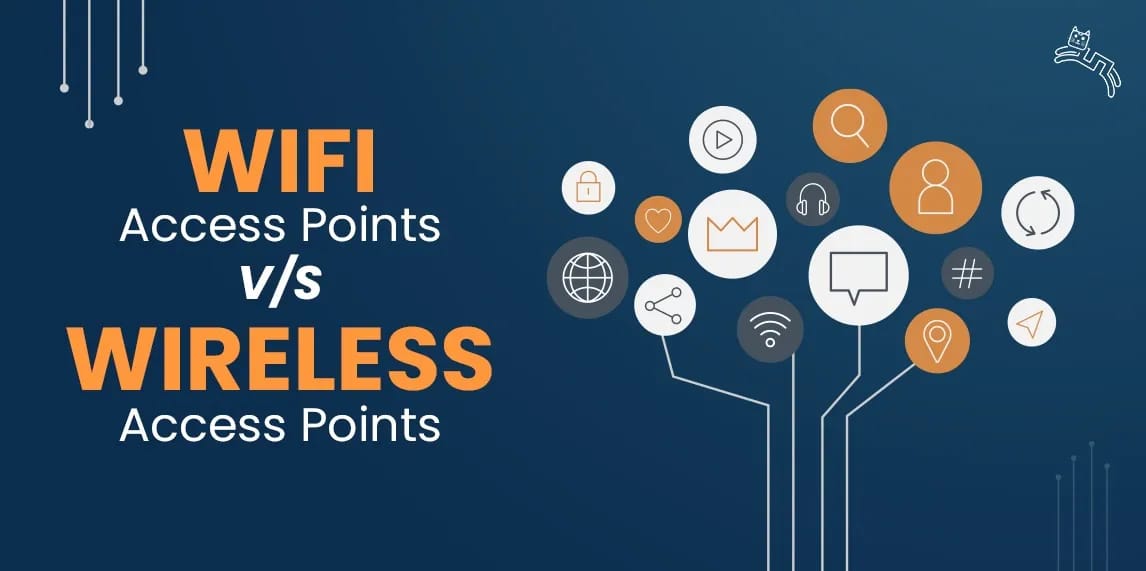WiFi Access Points V/s Wireless Access Points?

In our highly interconnected world, wireless networking has become essential. The terms "WiFi" and "wireless access point" are often used interchangeably, but it's crucial to get the key differences between the two concepts. Let’s go through them and explore what makes them apart!
Understanding WiFi
WiFi, short for wireless fidelity, enables devices to access a local area network (LAN) or the internet wirelessly. It operates based on IEEE 802.11 guidelines, using radio frequencies to transmit data between devices and a central access point. Devices such as smartphones, laptops, tablets, smart home appliances, and IoT devices can connect to WiFi networks.
Typically, WiFi networks consist of a modem, router, and one or more wireless access points. The modem establishes a connection with the internet service provider (ISP), the router manages data traffic within the local network, and the router also serves as the main hub for wireless access points.
You can explore the product options from the best wireless access points supplier in Dubai, Bizaar.
Understanding Wireless Access Points (WAP)
On the other hand, a wireless access point is a networking device responsible for extending the coverage area of a WiFi network. It acts as a communication hub between wired LAN and WiFi-enabled devices, bridging the gap between wireless and wired networks. Unlike a router, which may include wireless capabilities, a dedicated wireless access point's primary function is to provide wireless connectivity.
Large spaces like offices, campuses, hotels, and public areas often deploy multiple wireless access points strategically to ensure comprehensive coverage. For instance, Aruba outdoor access points are designed to bring WiFi capabilities to outdoor environments, enhancing mobility and coverage.
Key Differences
The fundamental difference lies in functionality. WiFi represents the system enabling wireless communication, while wireless access points act as bridges between wireless devices and the wired network, extending the WiFi network's range.
| Characteristics |
WiFi |
WAP |
|---|---|---|
Physical Appearance |
WiFi is an abstract concept representing wireless technology. |
Wireless access points are physical devices resembling small routers with antennas for wireless communication. |
| Deployment |
WiFi is present in various devices like routers, smartphones, and laptops. |
Wireless access points are strategically placed devices installed to enhance wireless coverage in large areas. |
| Management |
Managing WiFi involves configuring routers, security settings, and network names. |
Wireless access points are managed independently but can be centrally controlled through network management software. |
These are readily available at Bizaar, the best wireless access point authorized distributor. Whether you’re going for the ubiquiti distributor or MikroTik distributors, we are the solution!
Conclusion
To optimize wireless connectivity, whether for businesses, organizations, or individuals, understanding the distinction between WiFi and wireless access points is essential. Combining the right WiFi technology with well-placed access points enhances user experience and productivity. Bizaar offers a comprehensive range of access points. Explore the options and reach out to the best wireless access points supplier in Dubai.
Popular Categories
Networking Hardware : Access Points | Routers | Switches | Antennas | Fiber Networks | ISP Wireless Systems | Wi-Fi 4 (B/G/N) | Wi-Fi 5 (AC) | Wi-Fi 6 (AX) | Wi-Fi Adapters & Extenders | 4G/LTE/5G Wi-Fi Routers | ADSL Routers | Cloud Core Routers | Ethernet Routers | Other Routers | Wi-Fi Routers | Industrial Switches | Managed PoE Switches | Managed Switches | OS Consoles & Controllers | Unmanaged PoE Switches | Unmanaged Switches | Horn Antennas | Omni Antennas | Parabolic Dish Antennas | Sector Antennas | Twistport Adaptors | SFP Modules | Carrier Backhaul | Integrated CPE | Integrated Sector | Outdoor Radio | Network Security | Dedicated Firewalls
Computers: Laptops | All-in-Ones | i3 Laptops | i5 Laptops | i7 Laptops | i9 Laptops | Celeron, Pentium & Core Laptops | i5 AIOS | i7 AIOS
Printers & Scanners: Printers | Special Format Printers | Inkjet Printers | Inktank Printers | Laser Printers | Dot Matrix Printers | Thermal Printers & POS
Displays: Monitors | Projectors | Curved Monitors | LED Monitors 20" - 22.9" | LED Monitors Above 23" | LED Monitors Below 20"
Components & Storage: Components Memory | Graphics VGA Cards | DDR4 RAM | Hard Disk Drives | Solid State Drives
Gaming : Gaming Accessories | Gaming Headsets | Gaming Graphic Cards
Peripherals : Gamepads | Keyboards | Mouse | Headsets
PowerSolutions : PoE Injectors | Power Accessories UPS
Ruijie | Mikrotik | Ubiquiti | HPE Networking Instant On | Cudy | Slim | RF Elements | TP-Link | HP | Canon | Epson | Dell | Lightwave | Lenovo | Asus | AFOX |TeamGroup | HTC | Fortinet | Sonicwall | Zebra | Datalogic | Honeywell | Eaton | EVGA | MSI | PNY |Cooler Master | Cisco | Aruba | Logitech |UNV | Jabra | Yealink | Dinstar | Fanvil | Dahua | Easypos | ViewSonic | Engenius | Logitech | Bixolon | Gigabyte
 AED
AED 
